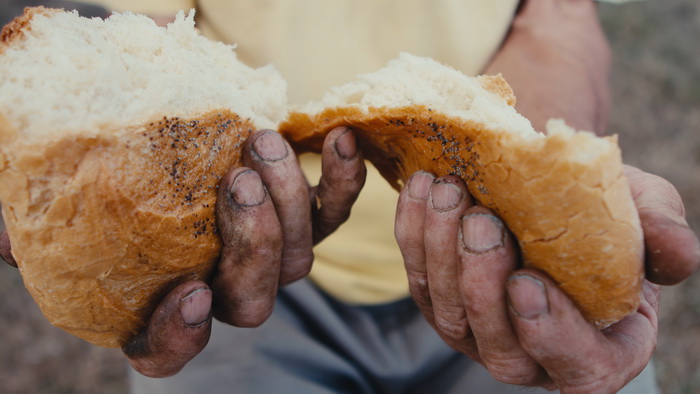The war unleashed by Russia has significant global impacts that will affect both Ukraine and the rest of the world, as our country plays a significant part in world food supplies. how the war in Ukraine will affect the dinner plates of average citizens of countries around the globe? Will the Ukrainian men and women themselves be deprived of essential groceries?
What is Ukraine’s role in international food security?
According to international sources, Ukraine is one of the leading suppliers of wheat, barley, maize, rapeseed, sunflower seeds oil, and rapeseed oil. Our country’s share in global grain export alone was 10% in 2020-21 and 14% in 2021-22.
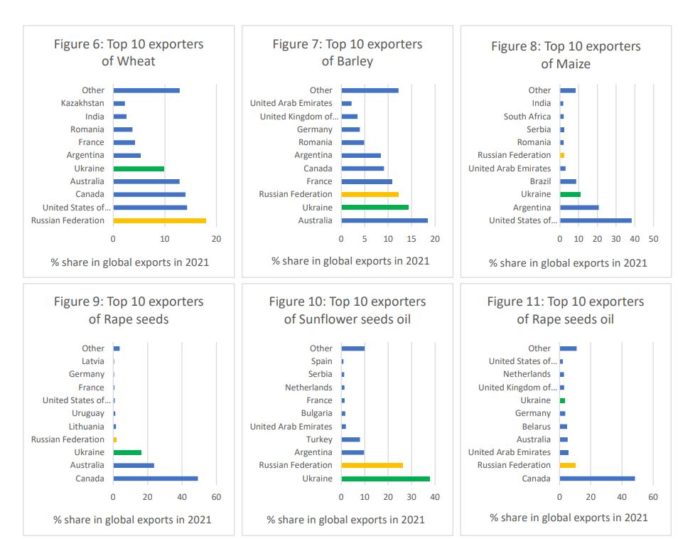
Ukraine is also the country of origin for half of the World Food Programme’s grain procurements for about 120 million malnourished people. Buying from us was cost-effective and logistically convenient, that is, before Russia blockaded the Ukrainian ports and mined nearly half of the Black Sea.
Russia’s war against Ukraine has already led to a drastic reduction in the grain supply and increased the global prices several times over, which, in turn, is going to wreak havoc with the budgets of African and Asian countries as early as next quarter. Indeed, according to Kyiv School of Economics, just one week after the Russian invasion of Ukraine, the price of wheat surged by 26%. This will surely have dire consequences for the importers of Ukrainian wheat, the top five of which in 2015 included, according to data provided by the UN World Food Programme, Egypt, Indonesia, Bangladesh, Pakistan, and Türkiye. The population of those five countries alone stands at 700 million people.
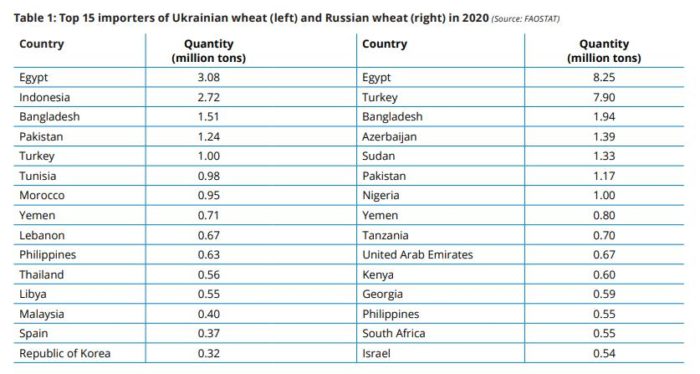
This shows that it is the developing countries that will primarily be affected by the global food shortages. Even if they find an alternative grain supplier, the prices will skyrocket — they already are.
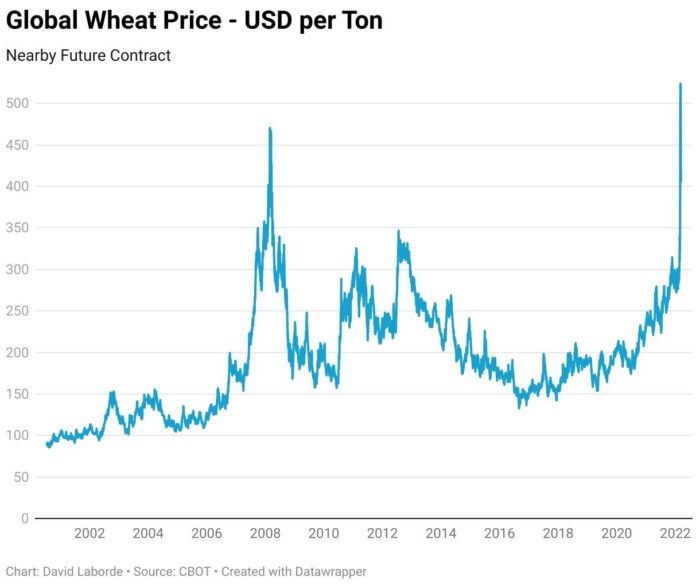
The importers may see Argentina and Canada as possible alternative suppliers, yet being several times longer than the usual shipping distance will affect the price of the produce. Besides, good crops in South America cannot be expected due to frequent droughts.
Who can afford to pay more?
While the Western European countries, the USA, and possibly China could likely afford to buy grain at a higher price, further upward pressure will pass on the increased cost of the final product and hit hard. In addition, many developing countries have been trying to tackle hunger around the world for decades. Yet the number of people undernourished increases each year, and the outbreak of war in Ukraine has given impetus to aggravating world hunger.
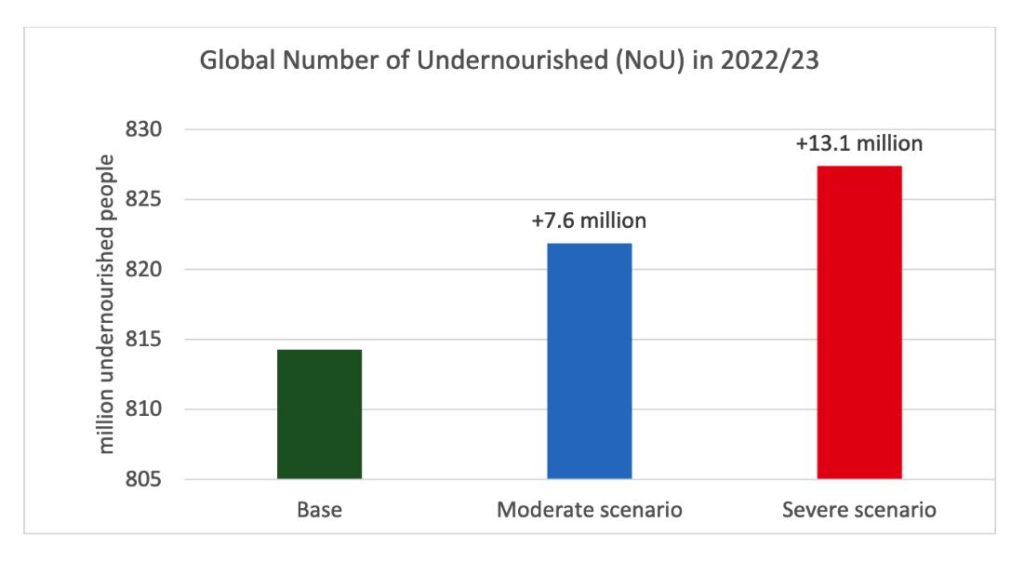
According to the international data, reduced grain exports from the Black Sea region pose no threat to food security in high-income countries, such as Germany. Even though food prices will rise, most households can cope with it. Russia may argue that it has grain and would like to help - but it won't be able to do so because of economic and financial sanctions — sort of a “food shakedown.”
How food-secure is Ukraine?
According to the former Minister of Agrarian Policy and Food, Roman Leshchenko,
“As of today, our country has two years’ worth of wheat stocks, five years’ worth of oil, and one and a half years’ worth of maize.”
However, the government takes preventive measures in order to reduce the risk of a food crisis in Ukraine.
First of all, the government issued a decree establishing new export rules. Exports in oats, millet, buckwheat, sugar, salt, rye, and live cattle are now forbidden, but exports of wheat, meslin (a mixture of wheat and rye), maize, sunflower oil, and chicken meat and eggs are allowed under new proper license. As for maize and sunflower oil, while these were initially restricted exports, the new decree reopened exports of these without any limitations. Some agrarian associations claim that previous licensing of these goods created only bureaucratic obstacles, as logistics are already complicated. Thus, the state has fully or partially restricted the export of important goods that should provide support for Ukrainians in their own country.
Second, the government has been actively working on providing Ukrainian farmers with state financial support during the sowing season. Importantly, such support is meant exclusively for small and medium agrarian producers cultivating up to 10,000 ha. It is the small family farms that managed to quickly adapt to wartime conditions and establish the logistics for their supply chains – but beyond the significance of this reach of major logistics pipelines, the work of these farmers is also crucial in light of the fact that displaced Ukrainians from all over the country are seeking refuge in the countryside. It is therefore of the utmost importance that the state makes every effort in supporting small farmers and family farms in order to ensure food security at the local level.
Third, Ukraine is actively preparing for the sowing campaign, however, according to UNGG, over 30% of Ukraine’s overall arable land is located in potential combat areas (such as Chernihiv, Sumy, Kherson, Mykolaiv, Kharkiv, and Donetsk.), making farming there dangerous. Nevertheless, the bulk of the crop acreage is being actively prepared for sowing, with the Poltavska oblast being one of the first regions to announce the launch of the sowing campaign throughout its territory.
https://twitter.com/MFA_Ukraine/status/1514152477230256128?s=20&t=Ryhl_ptS84xMoe6MejEYMA
Risks and solutions: What to expect from the food situation in the future
The Ukrainian government is actively implementing measures to minimize the risks of the food crisis in both Ukraine and the rest of the world. It is difficult, however, to predict whether these measures will work.
Moreover, the process of shipping goods is getting more complicated, both domestically and abroad. Large port cities have been caught up in hostilities, making shipping goods by sea out of the question. There’s only a narrow passage for delivering cargo by means of trucks and railways, which significantly reduces the scale of export. The logistics within the Ukrainian borders is also difficult, for the occupants are destroying the infrastructure, and shelling the cities and the roads, which affects transportation.
To address these challenges, the structure of Ukraine’s cultivated areas will be modified and adapted to domestic needs, depending on the availability of seeds, fertilizers, and so forth. At this moment, the decision-makers in Khmelnytska oblast are planning on increasing the crops of peas, barley, and sugar beet, and at the same time reducing the crops of maize and soybeans.
Furthermore, despite the export of wheat, meslin (a mixture of wheat and rye) being allowed, it is all subject to licensing, meaning the share of export is controlled by the state. That is, should the situation deteriorate and should Ukraine need more food for its own consumption, food export can be reduced even more dramatically.
Russia's war against Ukraine has put the world in a very awkward position in terms of food security. Many countries depend on exports of Ukrainian goods, which have now been drastically reduced or even completely cut off.
Not only have Russia's actions in Ukraine caused local humanitarian catastrophes in Mariupol, Kharkiv, and Kherson, they can cause a food crisis in many countries of the world. It is therefore imperative that the entire world, each and every country, must make an effort to stop the Russian aggression against Ukraine as soon as possible.

Mykhailo Amosov is Head of the Industry Greening Department at the Center for Environmental Initiatives Ecoaction, a Ukrainian ecological NGO that unites experts and activists and focuses on energy efficiency, renewable energy, countering climate change, clean air, and sustainable development of transport and agriculture in Ukraine.

Maria Diachuk is Industry Greening specialist at the Ecoaction Center for Environmental Initiatives
Related:
- Russian army leaves trail of death and devastation near Kyiv. How one village survived month-long occupation
- Russia turned Bucha into one big torture chamber. Dispatch from Ukraine
- Russian chemical attack suspected on besieged Mariupol yet Russia’s blockade leaves no room for confirmation
- Ukraine’s unanswered plea for MiG29s: consequence of NATO’s fear of Article 5

